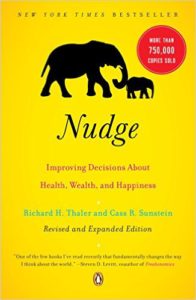This book will teach you how to use incentives to make the right decisions
Isn’t it interesting that despite knowing which things are good for us and which are bad, we keep doing them, sometimes on a daily basis? For example, most people know that smoking is bad for their health, that a healthy nutrition and exercises are good, and that they should save some money.
Despite that, people seldom act based on that knowledge and do the opposite of what is good for them. Stressing out, smoking a lot, having bad eating habits, and the list goes on and on.
Bad decisions like these can cause trouble later, and yet, we keep acting irrationally. We act on short-term reward rather than long term goals. So how and why exactly do we make our decisions?
Decisions based on too little or too much information
Rational decisions can only be made if we have access to all the information. For example when we go out and order our favorite drink. That decision is easily made because the place has a limited amount of drinks and we can check them all out on the card.
Our decision, however, isn’t really based on complete information if we haven’t tried every possible drink. Perhaps there is one which we would like even more than our current favorite. We just haven’t tried it yet.
Often we have too little information, and thus our decision’s effectiveness is limited. An equally big problem can be too much information. If the information we have is too complex, we can’t utilize it to make a rational decision.
Suppose you want to adopt a healthy diet. So you read some studies about diets. Soon you find out that nearly all studies disagree in some points. Even entire books are often not enough abstraction to make decisions about exactly what the best diet is. One study cannot possibly take into account all factors so there we need meta-analysis. We have to find that book which takes the broadest (based on most studies), best informed shot at nutritional advice. I would recommend this one by the way.
In short, too much complexity can overwhelm us and inhibit a good decision making.
Decisions based on our gut feeling
We tend to cope with overly complex information by taking instinctive our “gut” decisions. These decisions are based on simplification and work pretty effectively most of the time. But not always, especially when we are exposed to little information.
For example, smokers may cope with their habit by thinking and arguing that they know one person who smoked his or her entire life and lived healthily to old age. Cherry picking one person and ignoring thousands of examples and studies which show otherwise might only make you feel good if you lack the complete picture, namely, knowledge about those studies.
But even if people have a complete knowledge, that doesn’t at all mean that they will act accordingly. For example, a doctor, knowing cigarette’s hazard, might still smoke.
Laking Willpower
Often, however, it is the case that people indeed consciously know they are doing the wrong thing, but they do it anyway because they lack the willpower to overcome their bad habits.
Companies exploit weak decision making
Companies often take advantage of the previous point. They know that people make weak decisions, so they take advantage of that knowledge to maximize their profits. For example by offering XXL-sized portions instead of normal ones, or tempting subscribers by providing a trial period knowing that most subscribers will forget to unsubscribe on time even if they don’t intend to pay for the service in the first place.
Nudges can help people
Nudges are incentives which lead people in the right direction without forcing them to make a particular decision. For example, a shop can nudge customers to buy healthier foods by placing fruit close to the entry point and placing candies further back.
Companies have used nudges for a long time, supermarkets, for example, may place the most expensive products on eye level and certain things along the waiting line so that people buy things they otherwise would’ve skipped.
People often use nudges to change their behavior. If a person knows that by going out to a certain place he or she will likely make wrong decisions — drinking too much for example — not going to that place in the first place would be a nudge.
There are even websites like Stickk.com which let people make public commitment contracts, putting their money on the stack to ensure that they will push through and accomplish their goals. The money is there so that if they don’t accomplish their goals, it automatically gets donated to a person or organization which they initially selected.
Default nudges are very effective nudges which lead people to make the right decisions and save them trouble. Gmail, for example, reminds people about their attachment if it finds the word “attachment” in the mail, but no attachment is selected yet.
Companies should take advantage of nudges to lead their employees to the right decision, for example by enrolling them in a good healthcare plan by default.
States and other institutions do, and should also take advantage of nudges. If the majority of people don’t smoke, healthcare costs decrease besides of the obvious result of better health of individuals. That’s one of the reasons governments tax cigarettes heavily, high prices for cigarettes nudges people to smoke less.
In short: Nudges are incentives, and probably better known as incentives in economic terms. They constitute a good way to lead people to make the right decision on their own.
Liked this summary? Share it!

